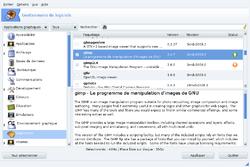Mandriva Linux
For the type of plant, see Mandrake
 Mandriva Linux 2010 | |
| Developer | Mandriva |
|---|---|
| OS family | Unix-like |
| Working state | Discounted |
| Initial release | 23 July 1998 (aged 27) |
| Latest release | 2011 / August 28, 2011 |
| Repository |
|
| Package manager | urpmi |
| Kernel type | Monolithic |
| Default user interface | KDE / GNOME / XFCE / LXDE |
| License | Various |
| Official website | Archived 23 May 2015 at the Wayback Machine |
Mandriva (formerly Mandrake Linux) is a Linux distribution.
The last release was the 2011 version released in August that year. Most Mandriva Linux developers who were laid off went to Mageia.
In May 2015, Mandriva went into administration.
Brief history
Mandriva was first made public by a French software company MandrakeSoft. Its first release was based on Red Hat Linux 5.1 and was released in July 1998. Mandriva Linux was originated by Gaël Duval, and intended to focus on ease of use for new users.[1]
From its first release to version 8.0, Mandrake named its flagship distribution Linux-Mandrake. From version 8.1 to 9.2 it was called Mandrake Linux.
In February 2004, MandrakeSoft lost a court case for infringement. It renamed its products. Starting from version 10.0, Mandrake Linux became known as Mandrakelinux, and its logo changed accordingly. Similarly, MandrakeMove became Mandrakemove.
In April 2005, Mandrakesoft announced the corporate acquisition of Conectiva,. As a result of this acquisition and the legal dispute with Hearst Corporation, Mandrakesoft announced that the company was changing its name to Mandriva, and that their Linux distribution Mandrake Linux would henceforward be known as Mandriva Linux.
Versions
Since 2007, Mandriva was released on a 6-month fixed-release cycle, similar to Ubuntu and Fedora. However, while newer features are added during each release, the timing of the Spring release stays the same as the first release, so as to ensure stability each year.[2]
Latest version
The latest stable version is Mandriva Linux 2011.0 (2011.0), released on 2011-08-28.
Development version
The development tree of Mandriva Linux has always been known as Cooker.[3] This tree is directly released as a new stable version.
The current release is named 2009.1 and was released in April 2009.
Table of versions
| Year | Number | Name |
|---|---|---|
| 1998 | 5.1 | Venice |
| 1998 | 5.2 | Leeloo |
| 1999 | 5.3 | Festen |
| 1999 | 6.0 | Venus |
| 1999 | 6.1 | Helios |
| 2000 | 7.0 | Air |
| 2000 | 7.1 | Helium |
| 2000 | 7.2 | Odyssey (called Ulysses during beta) |
| 2001 | 8.0 | Traktopel |
| 2001 | 8.1 | Vitamin |
| 2002 | 8.2 | Bluebird |
| 2002 | 9.0 | Dolphin |
| 2003 | 9.1 | Bamboo |
| 2003 | 9.2 | FiveStar |
| 2004 | 10.0 | Community and Official |
| 2004 | 10.1 | Community |
| 2004 | 10.1 | Official |
| 2005 | 10.2 | Limited Edition 2005 |
| 2005 | 2006.0 | Mandriva Linux 2006 |
| 2006 | 2007 | Mandriva Linux 2007 |
| 2007 | 2007.1 | Mandriva Linux 2007 Spring |
| 2007 | 2008.0 | Mandriva Linux 2008 |
| 2008 | 2008.1 | Mandriva Linux 2008 Spring |
| 2008 | 2009.0 | Mandriva Linux 2009 |
| 2009 | 2009.1 | Mandriva Linux 2009 Spring |
| 2009 | 2010.0 | Mandriva Linux 2010 |
| 2010 | 2010.1 | Mandriva Linux 2010 Spring |
| 2010 | 2010.2 | Mandriva Linux 2010.2 |
| 2011.0 | 2011.0 | Hydrogen |
| 2012.0 | 2012.0 | Bernie Lomax |
Mandriva Linux Media
Rpmdrake, Mandriva's graphical package manager
Related pages
References
- ↑ "LINUX - MANDRAKE". Linux Weekly News. Retrieved 2008-03-01.
- ↑ "New release cycle announced". Archived from the original on 2008-02-21. Retrieved 2008-04-22.
- ↑ "Development - Mandriva Community Wiki". wiki.mandriva.com. Archived from the original on 2008-03-07. Retrieved 2008-03-01.
Other websites
- Mandriva Official website Archived 2006-11-02 at the Wayback Machine
- Mandriva Community Wiki Archived 2006-04-11 at the Wayback Machine
- Mandriva Development Community Wiki (Cooker)[dead link]


